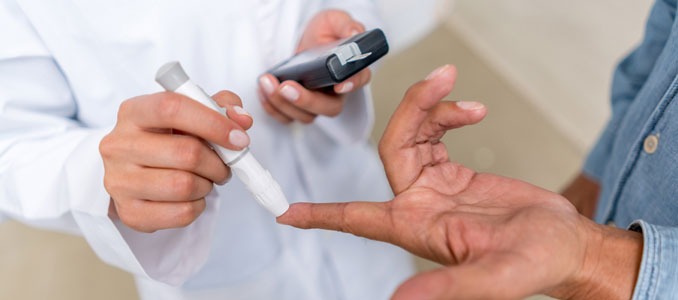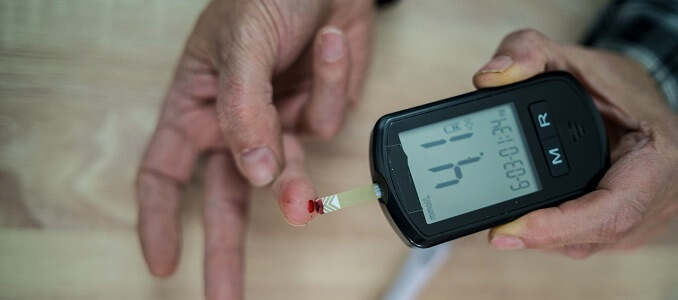Growth Hormone Deficiency and Hypoglycemia
Human growth hormone (HGH) is essential to the process of turning the sugar in the foods that you eat into energy for your cells. Therefore, there is a link between HGH and hypoglycemia.
What is Hypoglycemia?
Hypoglycemia is a condition in which your blood sugar (glucose) level is lower than normal. Hypoglycemia is often confused with diabetes, but they are not the same thing. Hypoglycemia is a problem for people who have diabetes. It happens to people with diabetes when their blood sugar drops due to taking too much insulin or a mismatch of medicine, food, and/or exercise.
Hypoglycemia or “low blood sugar” can happen in people without diabetes, but that is a rare occurrence. People mistakenly think of hypoglycemia as a disease in and of itself. It is not. Hypoglycemia is an indication that something else is wrong within the body, causing your blood sugar to drop. It is most often a side-effect of the medications used to treat diabetes.
An episode of hypoglycemia may require immediate treatment. If your blood sugar level drops below a point indicative of hypoglycemia – usually blood sugar below 70 milligrams per deciliter (mg/dL) – treatment involves quickly getting your blood sugar back to normal either with high-sugar foods or drinks or with medications.
Long-term treatment for hypoglycemia requires identifying and treating the cause of the condition. The is evidence to suggest that a growth hormone deficiency can lead to hypoglycemia.
Hyperglycemia is a condition when your blood sugar level is too low.
Hypoglycemia: Symptoms and Causes
If your blood sugar levels become low enough to result in hypoglycemia, the signs and symptoms can include:
- An irregular or fast heartbeat
- Fatigue
- Pale skin
- Shakiness
- Anxiety
- Sweating
- Hunger
- Irritability
- Tingling or numbness of the lips, tongue, or cheek
As hypoglycemia worsens, signs and symptoms can include:
- Confusion, abnormal behavior, or both, such as the inability to complete routine tasks
- Visual disturbances, such as blurred vision
- Seizures
- Loss of consciousness
Hypoglycemia is triggered when the level of glucose (sugar) in your blood falls below the accepted normal level. This can happen for several reasons. The most common cause of hypoglycemia is a side effect of insulin and the other drugs that are used to treat diabetes. In people with diabetes, hypoglycemia can also occur if you eat less than usual after taking your diabetes medication or if you exercise more than you normally do.
People without diabetes can also experience hypoglycemia. There can be various causes for “non-diabetic” hypoglycemia. These include:
- Medications – If you do not have diabetes, but you accidentally take someone else’s diabetes medication, it can rapidly cause hypoglycemia. Other medications can cause hypoglycemia. One example is quinine, used to treat malaria.
- Excessive alcohol drinking – Drinking heavily without eating can block your liver from releasing stored glucose into your bloodstream, causing hypoglycemia.
- Liver or Kidney Disease – Severe liver illnesses such as severe hepatitis or cirrhosis can cause hypoglycemia. Kidney disorders also affect glucose levels and cause hypoglycemia. Eating disorders such as anorexia nervosa can result in hypoglycemia due to lake of intake of the food your body needs to create glucose.
- Insulin overproduction – There are some diseases such as pancreatic cancer that can result in an overproduction of insulin, resulting in a hypoglycemic reaction similar to what happens in diabetes.
- Hormone deficiencies – Certain hormone deficiencies or imbalances, particularly growth hormone deficiencies, can lead to hypoglycemia.
Growth Hormone Deficiency and Low Blood Sugar
One of the symptoms of a growth hormone deficiency – particularly in children, can be low blood sugar or hypoglycemia. The relationship between human growth hormone and blood sugar levels is an interesting one.
Normally one of the functions of HGH in the body is the regulation of glucose metabolism. In a normal healthy adult, HGH secretions are intended to prevent hypoglycemia. When all is functioning properly, and your body is producing adequate supplies of growth hormone, growth hormone secreted by the pituitary gland enters the bloodstream to stimulate the liver to produce glucose. The secretion of HGH increases after eating, and it plays a vital role in metabolizing the food you eat into energy for your cells. In addition to telling your liver to produce more glucose after a meal, HGH also stimulates the release of another hormone known as insulin growth factor 1 (IGF-1). Glucose is stored in the liver as glycogen. IGF-1 stimulates the liver to breakdown stored glycogen and release it into the bloodstream as glucose.
HGH is instrumental in raising the level of glucose in your blood as needed. Therefore, if you are HGH deficient, it could lead to low blood sugar.
There is a link between HGH and hypoglycemia.
Does Growth Hormone Deficiency Cause Hypoglycemia?
Growth hormone is essential to how your body metabolizes sugars into energy (glycolysis) and how it burns fat (lipolysis). HGH also promotes ketone bodies (ketogenesis) that break down the fatty acids into the energy that the body can use.
In people with a growth hormone deficiency, any or all of these biological processes can be impaired, resulting in hypoglycemia.
Can HGH Therapy Treat Hypoglycemia
Research studies looking at the effects of HGH on glucose metabolism have shown that HGH does indeed increase glucose production through increased gluconeogenesis and glycogenolysis from the liver and kidney.
https://www.istockphoto.com/photo/bottle-of-human-growth-hormone-hgh-and-syringe-isolated-on-white-background-gm1300123568-392543579
A 2017 study acknowledged that hypoglycemia often occurs in adults with growth hormone deficiency (GHD), stating, “The clinical presentations of GH-deficient adults are characterized by increased visceral adiposity, insulin resistance, dyslipidemia, and hyperglycemia, which contributes to increased risk of cardiovascular morbidity and mortality.”
This particular study went on to identify that the hypoglycemia and other “metabolic disturbances” present in adults with GHD could be related to low levels of IGF-1 that accompany growth hormone deficiency in adults. “Because IGF-1 has anti-inflammatory properties and is important for glucose uptake from peripheral tissues, metabolic disturbances in GH-deficient adults can be explained by the IGF-1 deficit.”
When we treat patients with age-related growth hormone deficiency with growth hormone therapy, we have seen incidents of hypoglycemia decline.
HGH glucose and blood sugar level are all interrelated. To review, HGH affects metabolism. It suppresses glucose uptake and glucose oxidation and stimulates gluconeogenesis, glycogenesis, and lipolysis. One of the most important roles of growth hormone in normal healthy adults is achieving what is known as homeostasis in the blood – a state when sugar and all hormone levels are at the most stable levels for optimal health.
Conditions such as hypoglycemia are indicative that something is “off.” At its most basic level, growth hormone replacement therapy — as are all hormone replacement therapies – is designed to bring everything back into balance and help the body return to homeostasis. In that respect, HGH therapy can and does treat hypoglycemia.
In patients who are hypoglycemic due to growth hormone deficiency, growth hormone therapy could raise blood sugar levels to normal.
Besides returning blood sugar to more normal levels, the other benefits of growth hormone therapy for adults with age-related growth hormone include:
- Increased energy
- Better sleep
- Improved sexual function
- Improved moods
- Improved cognition
- Increased exercise capacity
- Increased bone density
- Increased muscle mass
- Decreases body fat
Now that you know more about the interesting connection between growth hormone and hypoglycemia, why not take a minute to contact us and learn more about the many other life-changing benefits of hormone therapy.




